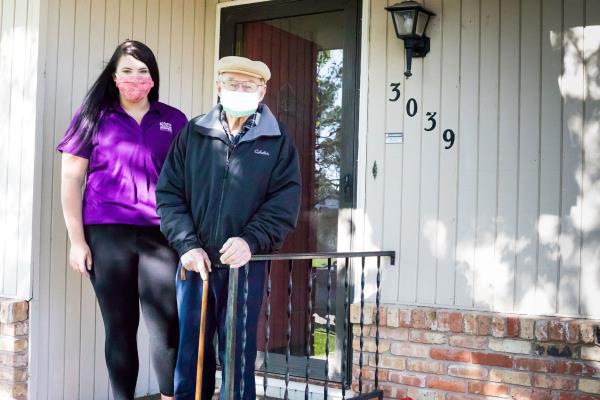Music. Entertainment. Art. High tech. Aging. One of these things is not like the others. Or is it?
For the past four years, Home Instead has curated content and convened global leadership in the Health and Medtech Track at South by Southwest on topics that uniquely position aging. And, for four years, those sessions have been packed. In March of 2023, we hosted a series of panels, and attendance was as high as ever, proving once again that—as our CFO, Andrew Steinberg, stated as he opened his panel session—“Aging, for lack of a better term, is pretty damn sexy, and deserves a place at South by Southwest.” At Honor, we would argue that aging deserves a prominent place at every table.
More older adults with more money to spend
What makes aging such a hot topic? A few things. One is the demographic shift. Steinberg’s panel, titled By the Numbers: Investing in the Future of Aging, addressed the rapid change we’re seeing in the aging population. In 30 years, the number of people 65+ will double. And the number of people 80+ will triple. Panel members, Tracy Chadwell of 1843 Capitol, Dr. Stephen Klasko of General Catalyst, and Lorna Sabbia of Bank of America spoke to the massive valuation of the “Silver Economy,” currently at $17+ trillion and growing. The buying power alone of the rapidly aging population represents an incredible opportunity for investors.
In parallel to this demographic shift, our aging society will increasingly need more care. And with more than 90% of older adults preferring to age in place, innovation is crucial in preparing our society to meet the expanding demands of this growing population. Investors who are looking to have a positive impact and see a financial return would be wise to leverage the Silver Economy.
When we look at the world and say, ‘Where is there white space for innovation,' the $350 billion care economy is a big one…People at 80 have a $1 million net worth and they’re spending that on their health and wellness.” - Tracy Chadwell, 1843 Capital
Watch: By the Numbers: Investing in the Future of Aging
We’re older for longer
Another seismic shift is longevity. Living to 100 is becoming common in our lifetimes, thanks to innovation in technology, healthcare, and sanitation. A retirement age of 65 made sense 60 years ago because folks weren’t expected to live much past that. Now that we might live an extra 30+ years, a lot of adults want—or need—to remain in the workforce longer. And their contributions can be extremely beneficial to said workforce. There’s just one problem: Ageism.
“We’re living in an era where aging is the last socially acceptable bias.” - Chip Conley, Founder of Modern Elder Academy
Melissa Mitchell, Executive Director of the Global Coalition on Aging, moderated a fascinating discussion addressing this topic. In Modern Elderhood: Reframing the Way We Age, Chip Conley, the Founder of Modern Elder Academy and Peter Kaldes, President & CEO of American Society on Aging spoke about the importance of changing long-held perspectives on aging. For employers, a five-generation workforce can tap into the accumulated wisdom of older adults, who tend to get better at things like systems thinking and coaching as they age. For older adults themselves, having a positive perspective on aging can actually add 7.5 years of additional life!
Watch: Modern Elderhood: Reframing the Way We Age
Philanthropy around aging is scarce
The United States is a very generous country. We support children’s causes, animals, the environment and more. But there’s one vulnerable population that’s consistently, severely underfunded by philanthropy: aging adults. Jisella Dolan, Chief Advocacy Officer, Home Instead, an Honor Company, hosted a panel titled Growing Good: Creating a Culture of Giving for All, to address what we can do for this underserved and underfunded population, as well as the family caregivers who often provide unpaid (and much needed) care for older adults.
“In America…only about 1 percent of our giving back goes to older adults in need…When we have something as universal across humanity as aging and family caregiving, we all need to lean in, do more, and give more.” - Jisella Dolan, Chief Advocacy Officer, Home Instead, an Honor Company
Weston Middleton co-founded One Family Foundation with actor, Bradley Cooper, after the actor had to step away from his work to care for his father. Weston joined Carter Florence, VP of Programs for Meals on Wheels, and award-winning filmmaker, Chris Durance, who is directing and producing a 4-hour documentary series for PBS called Caregiving for this important conversation. This discussion focused on why funding for aging adults is so scarce, what innovative partnerships and funding mechanisms are out there, and how all of us can support older adults and family caregivers with our time, talent, and giving.
One way Home Instead is giving back to older adults across the United States is our newly formed partnership with Meals on Wheels America. We’re rallying individuals to participate in or donate to our Power of a Knock campaign to help curb hunger and social isolation in older adults.
Watch: Growing Good: Creating a Culture of Giving for All
Find out for yourself why aging deserves a seat at SXSW, and in any conversation, by clicking any or all of the links above to watch or listen to our panels.


